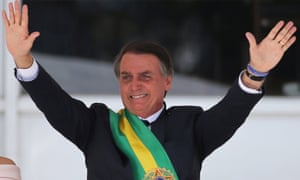Jair Bolsonaro’s messianic brand of capitalism threatens minorities and the rainforest that protects the planet
The
world needs to understand what Brazil has become, before it’s too late.
Jair Messias Bolsonaro’s Brazil is not just another country that elected a far-right president
at a time when the world’s most powerful nation is led by Donald Trump.
It’s not just South America’s version of the current trend of countries
sliding into authoritarianism, like we’ve seen in Hungary, Poland,
Turkey and the Philippines. It’s not simply a peripheral nation with a
pathetic leader. Brazil has become the apocalyptic vanguard that signals
how radical this moment is – one with the power to worsen the climate crisis at top speed and blight the entire planet.
"Bolsonaro was elected in October, on his pledge to go back ‘50 years'. Brazil lived under a military dictatorship then"
The election of Bolsonaro is a response to what we might call
civilisation’s new discontent. Maybe people can’t identify the source of
their anxiety, which has driven up the consumption of tranquillisers
and sedatives. The average citizen might apply more familiar labels to
the corrosion of their quality of life, air, and water; to a relentless
fear of the “other”; to the feeling they’re walking in quicksand. But
what’s underpinning this new discontent pervading all areas of human
experience is our climate crisis."Bolsonaro was elected in October, on his pledge to go back ‘50 years'. Brazil lived under a military dictatorship then"
Bolsonaro was elected in October, on his pledge to go back “50 years”. Fifty years ago, Brazil lived under a military dictatorship. For Bolsonaro and his followers, who are outright defenders of torture and the elimination of adversaries, it was a glorious era. Despite the terrifying menace of nuclear war, the world was still a place where science promised nothing but progress and solutions – it delivered no bad news, like global warming, that led to limitations on an individual’s daily life or on government actions. It was a time when white, heterosexual men held power and knew precisely who they were. They may have faced some resistance from minorities, but they still enjoyed absolute hegemony.
We cannot comprehend what is now happening in Brazil – and around the world – unless we understand that our culture wars are tightly bound up with humanity’s need to say goodbye to 20th-century illusions of power and face a planet made more hostile by human hand. Things will soon reach catastrophic levels if nations and their residents do not unite in a global effort to do something extremely hard and unpopular: impose limits on ourselves to counteract global warming.
The election of Bolsonaro ties all this together like no other event. The Bolsonaro administration promises a “new era” – a return to a time free of doubts and insecurity, with certainty about what a man is and what a woman is and a clear sense who’s in charge of the public sphere and the family. Their ultra-conservatism is at times corny, at times biblical – but never innocent.
Jair Bolsonaro's provocative views in six clips – video
Ernesto Araújo, the dogmatic foreign minister, said Bolsonaro’s rise will be marked by “God through the nation”. He has also written that climate change is an “ideology” dreamed up so imperialist nations could determine Brazil’s future. “The people who say there are no men and women are the same ones who preach that countries don’t have the right to protect their borders,” Araújo stated in his inaugural speech.
This Brazil, stitched from a patchwork of dogmas, might be a fascinating topic of study if it didn’t put the whole planet at risk. Ideological discourse serves to instil the notion of destiny and to ensure cohesion within a population frightened about everything it might lose, from salaries and jobs to symbolic positions in the realms of race, gender, and sexual orientation. When Bolsonaro says he’s going to “free Brazil from political correctness”, he’s pledging to break both the “chains” that force people to respect minorities and those that curtail devastation of the Amazon forest.
In his first days in power, the president shifted responsibility for demarcation of indigenous and quilombola territory – which makes up a large part of the protected Amazon – to the agriculture ministry. This government sector is controlled by agribusiness, responsible for much of deforestation and eager to get their hands on the remaining forest. Bolsonaro promised to turn the public land occupied by indigenous peoples into private land where mining and agribusiness concerns can reap profits. The goal is to make more forest land available for capitalist speculation: cattle, soybeans, mining, and major construction projects.
Celebrations and protests in streets of Brazil after Bolsonaro win – video
The deforestation rate for 2018 was the highest in a decade. The mere possibility that Bolsonaro might win had a liberating effect on deforesters and further inflamed conflicts in a country where more environmental defenders are killed than in any other.
Without the world’s biggest tropical forest, there is no way to control global warming. If Bolsonaro’s messianic capitalism is not stopped, life on this planet will be much worse for everyone. For a contingent of neo-Pentecostal evangelicals, this may be welcomed as an apocalypse preceding the final salvation of “true believers”. For most of humanity, it will bring nothing but horror and suffering – perpetuated by the stupidity of a species with delusions of grandeur.
Translated by Diane Grosklaus Whitty
•Eliane Brum is a Brazilian journalist, writer and documentary maker

No comments:
Post a Comment